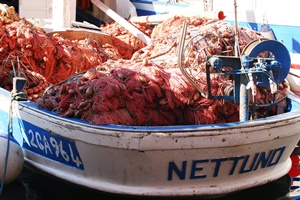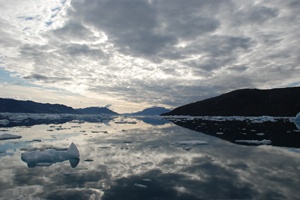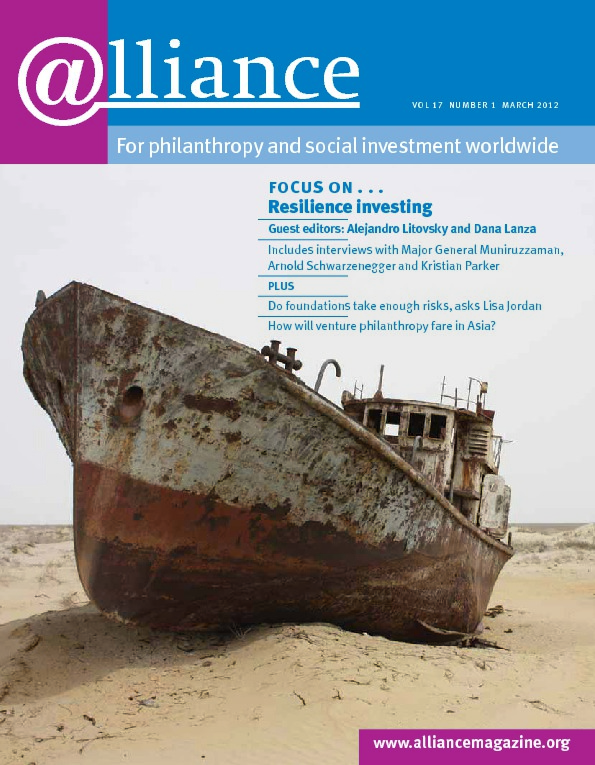‘We are now shifting our focus to places where there is political vision and will, such as the emerging economies of Brazil, India and China.’
The Oak Foundation is among the largest and most strategic environmental funders in Europe. Over the past 15 years, its chair, Kristian Parker, has played a leading role in shaping Oak’s environmental agenda and has encouraged other funders to get more involved with issues like the sustainability of the oceans. In this interview for Alliance, he speaks to Alejandro Litovsky of the Earth Security Initiative and takes stock of his work so far. As environmental limits begin to suggest a planetary crisis, where should foundations go next?
The oceans, and now climate change, have a prominent role in your strategy. Why?
In 1998 our family foundation was beginning to define its agenda for the environment. At the time I was doing my PhD in biology and marine ecosystems and I was given a fair amount of leeway from the family to find the direction for the environment programme. The oceans agenda was a natural direction, given my education and contacts. As we went along, that interest was reinforced by the fact that few funders were focused on the oceans, and we saw an opportunity to have an impact.
Have I had moments of frustration over the last 15 years? Definitely. Working in Europe has been frustrating: the science is clear enough and policy solutions are clear enough, but political will is missing. It is more difficult to convey the sense of urgency about the oceans to the public than, say, deforestation. One satellite image can convey the annual destruction of the Amazon; there isn’t such a simple visual representation of the degradation of large marine ecosystems. However, we now have a fairly good understanding that the time window to create change is relatively short.
What has happened with the oceans agenda over the last 15 years?
In the past 15 years we can certainly say that the overall situation of the world’s oceans has deteriorated markedly. Poor management of fisheries in ocean waters under national jurisdiction is a main reason for this. But we are also seeing overfishing even in international waters, and this phenomenon seems to be strongly correlated to funding subsidies to large commercial fisheries for the fuel they use in their long journeys. What is ironic is that solutions for improved fisheries management are now well known. Some bright spots can be seen. For example, we have observed improvements in fisheries in the US after the passage of national legislation on this issue, and also in New Zealand and Australia. However, in Europe the situation is dire, and we are very concerned by the fact that the current Reform of European Common Fisheries policy, which is under way, will not lead to much progress. Among the developed world, Europe has one of the worst records on fisheries management, and it is truly a matter for shame.  (Pictured right: Bundles of nets on the illegal driftnetter Nettuno’s bow in Port of Ponza, Italy. The picture was taken on an expedition to monitor illegal fishing in the Mediterranean, funded by Oak Foundation and carried out by Oceana. Their reports led to new rulings by the European Court of Justice enforcing the EU driftnet ban and the ultimate dismantling of the French and Italian driftnet fleet.)
(Pictured right: Bundles of nets on the illegal driftnetter Nettuno’s bow in Port of Ponza, Italy. The picture was taken on an expedition to monitor illegal fishing in the Mediterranean, funded by Oak Foundation and carried out by Oceana. Their reports led to new rulings by the European Court of Justice enforcing the EU driftnet ban and the ultimate dismantling of the French and Italian driftnet fleet.)
But it is also becoming clear that this is not just about biodiversity but also about human security, including whether we can sustain the production of food for a growing population. We forget how much of the world’s food protein comes from the oceans.
It is not just that billions of people depend on fish for their diet, which is a major issue in its own right. The number of people needing food is increasing all the time. Now that we’ve reached 7 billion people on the planet, if we let global fisheries collapse, we can’t expect the food we get from the oceans to be replaced with food from land-based agriculture – that would be disastrous. If this was the case, you could forget about terrestrial conservation altogether, as millions of hectares of pristine habitat would have to be destroyed to make room for agriculture. The fisheries of the world are in bad shape; and as the world population continues to grow, we will need more – not less – food. How will we meet that challenge? We need a greater focus on protecting ocean resources as an issue of human security. If we did think this way, the sustainable management of fisheries would be a top priority. But is far from being at the top of the global agenda at this point. Far from it.
The broader security issues now need to come on to the map as well. For example, the oceans are not yet part of the climate negotiations even though they are the primary regulators of global temperature and oxygen production. We need more awareness of the pivotal role of marine ecosystems in the global system; their resilience to the current pressures and global warming is a critical issue.
 How did climate change come on to your radar?
How did climate change come on to your radar?
Being a biologist, it wasn’t difficult for me to see that small changes in average temperatures will have cataclysmic effects on ecosystems. Organisms are defined in terms of their tolerance to temperature and oxygen levels. Now here we are changing global average temperatures, which means that a great number of organisms will be challenged to survive. Beyond the obvious increase in water temperature, we are also observing that the oceans are becoming more acidic, as some of the carbon that is emitted into the atmosphere is absorbed by the world’s oceans. Ocean acidification makes the process of skeleton-building much more difficult, creating an added major threat to marine life. From a biological point of view it is easy to understand why carbon abatement is so important.
It took me a long time to get my mind around the magnitude of the impact that CO2 emission will have on the oceans. Ocean acidification is poorly understood, but the consequences it will have on food chains and the oceans’ ecological services like oxygen production will be of massive proportions. Here I see a need for champions at a political level who can begin to see the issue of defending the oceans and take it to the climate negotiation table. Australia could be one of those champions if they can get their heads around how much value they derive from the Great Barrier Reef.
I don’t think we are fully prepared to deal with the security implications of climate change. Think about the changes in rainfall patterns – the droughts, floods and diseases. The knock-on effect on humans is massive. You can argue that biodiversity has no value, but you can’t argue that the stability of agricultural systems has no value. I see the mission of our foundation as helping to shift the focus of the climate debate towards human security issues.
The low level of political interest in curbing emissions and preserving fisheries seems out of touch with this reality. What does this all mean to you as a funder?
It means a few things. One is that we need to be flexible. We are now shifting our focus to places where there is political vision and will, such as the emerging economies of Brazil, India and China. We will focus less on countries that overall are on the right track and can fend for themselves, such as the EU, and those such as the US, which have been consistently declining to take their share of responsibility. It means that we have to go where the opportunities are; we can’t afford to bang our heads against the US political system for the next five years.
It also means that foundations need to collaborate even more, and at a greater speed. We can do more and better through mechanisms like funders’ collaboratives. Ultimately, without scale our work won’t make a difference. One such example is our collaboration with Climateworks Foundation. In 2006 six foundations, including Hewlett, Packard, MacKnight and Oak, commissioned a study called Design to Win, which attempted to answer the questions ‘what is the role of philanthropy in reducing carbon emissions globally, where should we focus, and how much should the sector invest in order to meet the global climate change challenge?’ Beyond defining six key countries and six main economic sectors that should be the focus of the work, Design to Win led to the creation of Climateworks, which is currently the largest pool of philanthropy funding exclusively dedicated to carbon abatement. Local offices were created or enhanced in the major priority countries/regions, and a truly extraordinary amount of sectoral analysis, policy development and exchange of best practices is already taking place as a result.
Beyond our support for policy improvements, we also support fieldwork on issues that cut across climate change and marine biodiversity. We support increasing the resilience of two regions: Belize and the Arctic. There are common themes in the situations these areas are facing, such as the growing need for natural resources such as fish and oil respectively. I don’t believe that over the next 50 years oil can be explored in the Arctic without major disasters like oil spills. Can these ecosystems withstand these changes? Do we understand the trade-offs? Both areas are faced with climate change, and both have the challenge of remaining resilient in the context of rapid economic pressures; there are real risks. But we don’t have enough time or money to replicate these models forever –we must have new strategies, like the agenda of large marine protected areas (see Joshua Reichert’s article). We must think big.
What would you like to see philanthropists and social investors doing in the next five years?
We as a sector need to take a step back, take a look at the trends, and see that they are not adding up to what needs to be achieved. We know time is short, and we need to be taking bigger risks for bigger ideas in order to generate political influence.
I personally would like to take more risks, and we have to find more and better ways of doing that. One option is to encourage risk in our partners that are doing the work. We must ask, ‘does civil society believe that philanthropic funding is supporting enough risk-taking?’ We also have to get civil society more comfortable with taking risks and thinking bigger.
I’d like to see new collaborations between funders that are looking at the big environmental agendas, and hopefully establish a pool of funds among a few like-minded foundations or individual donors. Such a funding pool should award a few grants a year for the best high-risk, high-impact ideas to beat the deadline we have on the earth.
I’d also like to see funders encouraging NGOs to think in riskier terms. The current excessive focus on accountability and on measuring and reporting project impact is having a somewhat negative effect on the way that NGOs plan their activities: they are becoming excessively concerned about not ‘over-promising’ or ‘over-committing themselves’. In the end, the projects they submit lack ambition and bold vision. We need to help reverse this trend by enabling an environment of creativity, boldness and risk-taking. A task for foundations themselves is to be more explicit about their agenda for risk; we need a new wave of risk-taking attitudes. But risk-taking is not just about spending more money in larger projects; it is also about being cleverer about the key leverage points, filling in eventual organizational gaps when a major niche is still empty, etc. I would like to see this issue of risk and big ideas being more prominent in the sector.
We must find new ways of tackling difficult issues like subsidies, which are essential to the various destruction patterns we see. Tackling subsidies is one opportunity to act at a global scale. That’s one example of something that could be dealt with as a collaborative. Maybe we won’t control the World Trade Organization’s Doha round, but we must ensure that if Doha goes forward, phasing out the subsidies that support destructive practices is one of the main items in the agenda. At this time of over-indebtedness in the developed world and of concern over carbon emissions, for example, it seems to us that fossil fuel subsidies are not only an anachronism but an absurdity. The time is ripe for advocating a phasing out of such subsidies, and philanthropy should collaborate in order to enable NGOs to carry out that advocacy successfully.
For more information
http://www.oakfnd.org


Comments (0)